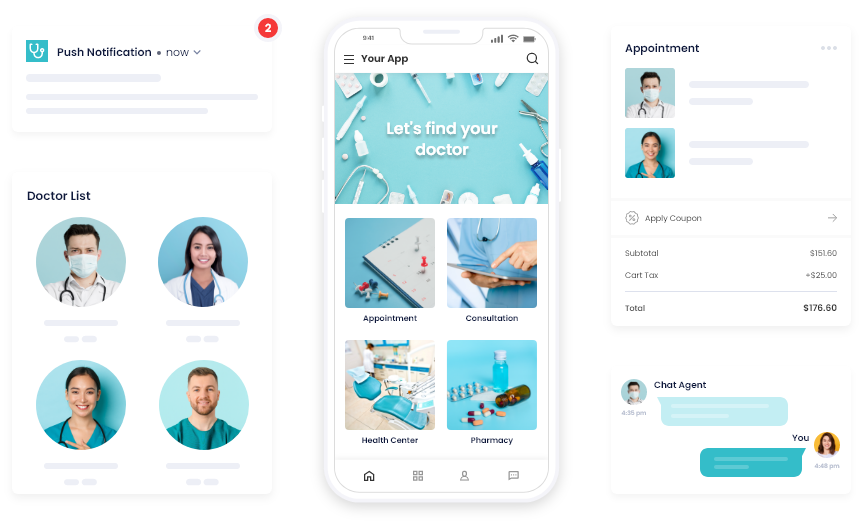Streamline Operations: Why Your Clinic Needs a Mobile App for Clinics Now
The Future of Medical Care: Why Clinics Required a Mobile Application Today
As the medical care landscape continues to develop, centers deal with installing stress to adapt to individual assumptions for higher benefit and access. The integration of mobile applications can serve as an essential strategy for boosting person involvement and streamlining procedures.
Changing Patient Expectations
As the landscape of healthcare evolves, person assumptions are going through a significant transformation. Today's clients are increasingly seeking convenience, accessibility, and personalized care.
Moreover, patients are coming to be extra notified and encouraged, commonly looking into problems and treatments online before appointments. This heightened awareness is combined with a need for openness in medical care processes, including cost estimates and treatment choices. Consequently, carriers are urged to adapt by embracing digital tools that improve the individual experience.
The assumption for prompt and efficient interaction has actually never been higher, with lots of clients taking into consideration responsiveness an essential element of high quality treatment. mobile app for clinics. In this developing landscape, medical care companies need to identify these transforming assumptions and leverage mobile applications to cultivate a more patient-centric method, making certain that they not only meet yet surpass the requirements established by today's educated customers
Enhancing Person Engagement

Mobile applications assist in communication in between people and healthcare suppliers, allowing real-time visit scheduling, suggestions for drug adherence, and direct messaging attributes. These functionalities not just improve convenience but additionally construct a feeling of liability amongst clients. Mobile applications can supply educational content customized to specific requirements, aiding individuals better understand their problems and treatment options.
The integration of gamification elements within healthcare applications can additionally inspire individuals to involve in healthy and balanced actions, reinforcing positive way of life adjustments. By tracking progress and fulfilling achievements, patients are extra most likely to stay devoted to their health and wellness objectives. Ultimately, boosting person interaction with mobile applications causes boosted health and wellness results, greater patient fulfillment, and a much more collaborative health care experience. Centers that prioritize this element will likely see a considerable effect on the top quality of care provided.
Simplifying Center Workflow
Improving clinic operations is essential for enhancing workflow efficiency and maximizing individual treatment. The implementation of mobile applications can significantly lower administrative burdens, permitting medical care carriers to concentrate more on patient interactions. By automating appointment organizing, individual check-ins, and billing procedures, centers can reduce wait times and boost total operational performance.
Mobile apps additionally help with real-time access to client records, allowing medical care professionals to make informed choices swiftly. This immediacy not just improves the high quality of treatment but also minimizes the chance of you can try here mistakes related to misplaced or obsoleted details. Additionally, leveraging mobile innovation supports an extra orderly strategy to managing person follow-ups and treatment strategies, making certain that no vital actions are ignored.
This permits for timely replenishment and assists prevent disturbances in patient treatment due to stock shortages. By integrating these functionalities into their day-to-day operations, clinics can develop an extra reliable and natural atmosphere, eventually leading to improved client outcomes and satisfaction.
Improving Communication Channels
Effective interaction is frequently mentioned as a keystone of quality health care distribution. In today's busy clinical atmosphere, mobile applications can substantially boost communication channels between centers, patients, and doctor. By incorporating mobile apps right into their procedures, facilities can facilitate real-time communications, guaranteeing that individuals get timely details regarding their consultations, examination outcomes, and therapy strategies.
Mobile apps likewise equip clients to interact straight with their medical click to read care groups with why not try this out safe and secure messaging features. This direct line of interaction promotes a feeling of involvement and permits instant clarification of issues, which can lead to better adherence to therapy protocols. In addition, push alerts can remind individuals of upcoming consultations or medication schedules, decreasing no-show rates and boosting total health outcomes.

Staying Competitive in Medical Care
In a swiftly advancing healthcare landscape, companies need to prioritize innovation and versatility to preserve an affordable side. The integration of mobile applications into medical care solutions is no much longer optional; it is vital for clinics aiming to improve individual involvement, streamline procedures, and boost overall service delivery.
As patients increasingly depend on digital platforms for health and wellness management, centers that fail to take on mobile innovation threat falling back. A properly designed mobile app can supply functions such as appointment organizing, telemedicine assessments, and accessibility to medical documents, supplying clients with benefit and promoting loyalty.

Rivals are also investing in mobile services, so staying in advance calls for constant improvement and remaining notified about technical improvements. Clinics have to not only apply mobile applications however also take part in normal updates and refinements. Eventually, the effective combination of mobile innovation will certainly differentiate forward-thinking medical care organizations and established the standard for patient-centric treatment in an electronic world.
Final Thought
In final thought, the combination of mobile applications in clinics is necessary to deal with the advancing landscape of client assumptions. Eventually, the calculated execution of mobile applications represents a vital step toward supplying individualized and easily accessible health care, consequently fulfilling the demands of today's equipped individuals.
Inevitably, boosting client involvement through mobile applications leads to improved health and wellness results, greater person complete satisfaction, and an extra collaborative healthcare experience.Mobile applications also promote real-time accessibility to person documents, making it possible for medical care specialists to make informed choices promptly. In today's busy medical environment, mobile applications can significantly boost communication channels between facilities, people, and health care suppliers.Mobile applications additionally encourage individuals to communicate straight with their health care groups via safe messaging functions. Ultimately, the strategic application of mobile applications represents an important action towards delivering obtainable and customized medical care, thereby fulfilling the demands of today's empowered individuals.